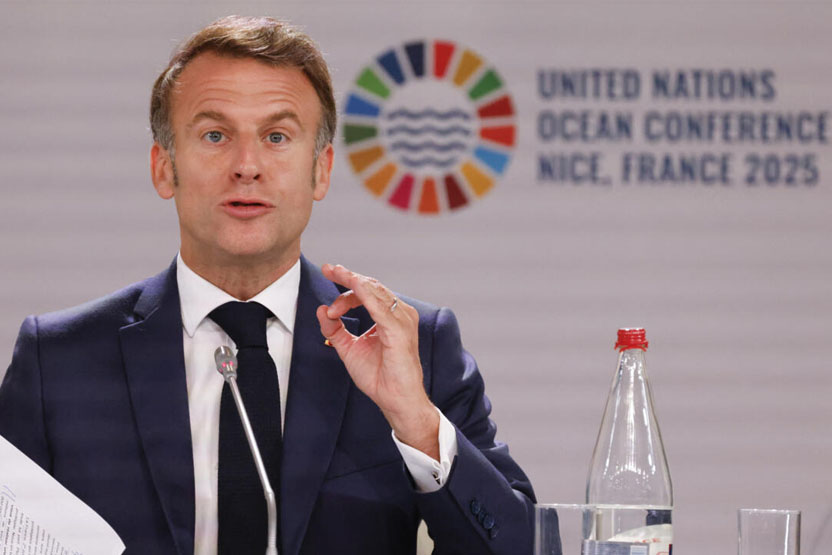
French President Emmanuel Macron delivers a speech during a meeting at the Nice Convention Center ahead of the third United Nations Ocean Conference.
Today, in the French city of Nice, the proceedings of the “Third United Nations Ocean Conference” began, which French President Emmanuel Macron intends to turn into a summit to rally efforts, while the United States has decided to boycott it, which may have repercussions on decisions and commitments.
It is expected that 50 heads of state and government will attend, while the United States will be absent. The discussions, which will continue until June 13, will focus on deep-sea mining, the international treaty on plastic pollution, and regulating overfishing.
President Emmanuel Macron told the newspaper Ouest-France that this summit aims to “rally efforts, at a time when climate issues are being questioned by some,” expressing his regret over the absence of the United States, which possesses the largest maritime area in the world.
Former U.S. President Donald Trump unilaterally decided to open the way for mining in the international waters of the Pacific Ocean, bypassing the “International Seabed Authority,” the intergovernmental body that the United States is not a member of, as it has not ratified the United Nations Convention on the Law of the Sea.
France has set ambitious goals for this UN conference, which is the first of its kind to be held on its territory since the COP21 climate conference that Paris hosted in 2015.
French Foreign Minister Jean-Noël Barrot said that France “seeks for the conference to be for oceans what the Paris Agreement was for climate ten years ago.”
A few months ago, French President Emmanuel Macron expressed his desire to collect 60 ratifications in Nice to allow the High Seas Treaty to enter into force, and without that, the conference would be a “failure,” according to a statement made by French Ambassador for Ocean Affairs Olivier Poivre d’Arvor last March.
A decorative fish model hanging on one of the doors in the city of Nice before the Third United Nations Ocean Conference
Sustainable Development for Oceans
The treaty, adopted in 2023 and signed by 115 countries, aims to protect marine ecosystems in international waters, which cover about half of the Earth's surface area. So far, it has been officially ratified by 28 countries and the European Union.
France also hopes to expand the coalition, made up of 33 countries, that supports a moratorium on deep-sea mining. Informal discussions among the delegations are also expected to address negotiations toward a treaty to combat plastic pollution, which will resume in Geneva next August.
Paris also hopes to push forward the ratification of agreements related to combating illegal fishing and overfishing. On Saturday, under pressure from non-governmental organizations, the French president announced restrictions on trawling in some marine protected areas.
The Élysée Palace emphasized that the Nice summit “is not a fundraising conference in the strict sense of the term,” while Costa Rica, the co-hosting country of the conference, said it hopes to raise 100 billion dollars in new financing for sustainable ocean development.
Brian O’Donnell, director of the “Campaign for Nature,” a non-governmental organization working to protect oceans, criticized the issue of funding shortages, saying: “We have created a myth that governments do not have the funds necessary to protect the oceans,” adding that “the money exists. But there is no political will.”
Among the multiple events organized as part of the conference, which concludes on June 13, are a conference on ocean sciences, a forum on the blue economy and blue finance, and a summit of the Ocean Rising Alliance and Coastal Resilience.


Comment